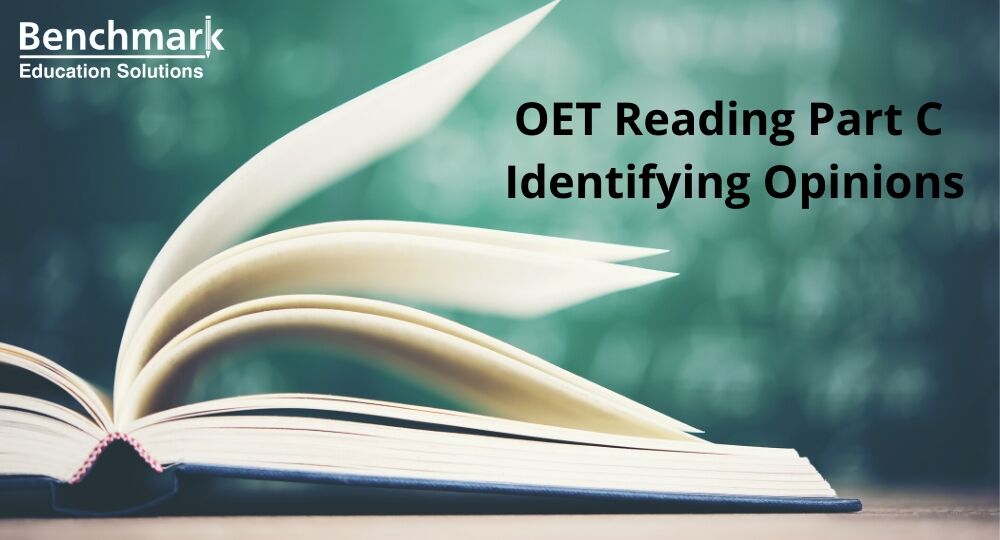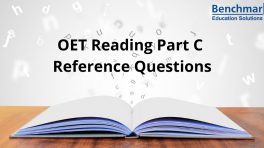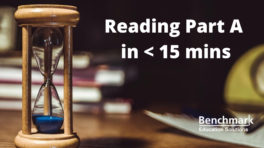Identifying Opinions in OET Reading Part C
- 11 Comments


In OET Reading Part C sub-test, you will be presented with two rather long texts of general healthcare interest and you will have to answer questions regarding those texts.
Table of Contents
One of the skills you need when attempting OET Reading Part C questions is to get a gist of the entire passage. This includes identifying any opinions that may be present in the text. The opinions can be the writer’s opinion or the writer may be telling you what someone else’s opinion is. Oftentimes, you may not be able to find the exact same words used in the question as in the text. This is where a general understanding of the entire passage is so important.
Having said that, we are glad to tell you that there are some reading tips that can help you improve your OET Reading Part C and learn how to identify opinions.
1. Look for common opinion-signaling words (belief, think, say)
There are some common words that are used to signal that an opinion is being presented. Of course, the explicit term ‘opinion’ may be used, as in, ‘In my opinion…’. However, there are other words that you can look out for such as ‘think’, ‘belief’, and ‘say’. Here are some examples:
- In the Newcastle Herald in July 2005, Emeritus Professor Bill McCarthy of the Sydney Melanoma Unit is quoted as saying “I want to make it clear that I believe some clinics are very careful and do good work”.
- I don’t think that the way HIV is being portrayed in the media is at all helpful.
- It’s no wonder you’re confused. One group of scientists says that reducing red and processed meat is a top priority for your health and the planets. Another says these foods pose no problems for health. Some of your friends may say it depends, and that grass-fed beef and “nitrite-free” processed meats are fine. At the same time, plant-based meat alternatives are surging in popularity, but with uncertain health effects.
- Roisin, one of the nurses on a picket line, tweeted, “After almost 30 years in nursing, I have seen some of the most heartbreaking things you could imagine and cried many tears. I can honestly say that today is the saddest day of my career.”
Looking at individual words in isolation may not be able to tell you if a sentence is an opinion. You will need to read the sentence critically in order to really understand the message. However, looking at words for clues will prove to be a good starting point.
2. Opinions may be accompanied by ‘hedging’ words (likely, probably)
Hedging words are words that are used to limit a claim or statement. For instance, instead of saying ‘I will attend your party tonight’, you can insert a hedging word such as ‘probably’ to limit the certainty of your statement, so you can say, ‘I will probably attend your party tonight’.
Sometimes, when people give an opinion, they like to insert hedging words to show a bit of uncertainty. It also signals that it is their own opinion, in a way, and that they are unsure about it. These examples show how hedging words are used to express an opinion.
- So, let’s think about physical activity in a different way. As a nurse who researches exercise, I can tell you that it is likely the closest thing to a fountain of youth or a magic pill that you will have in your lifetime.
- In fact, increasing your physical activity is probably easier than you think. You don’t need to buy expensive equipment or join a gym. And you will begin to reap the rewards of physical activity almost as soon as you start. Adding small amounts of movement to your daily routine goes a long way.v
3. Look for words that signal emotion or subjective judgment
Since opinions are subjective, they are often accompanied by some judgment words (such as good, bad, remarkable, foolhardy, etc). Here are examples of these words being used in sentences.
Example 1
- This is a compelling idea, fuelled by examples of parasites seemingly controlling the behavior of their hosts, such as the Ophiocordyceps fungus that infects ants.vi (Note: compelling = interesting/captivating)
In this example, the word ‘compelling’ is what the writer thinks of the idea. So, in the writer’s opinion, the idea is compelling. In an exam situation, an option may be given in the multiple-choice question which includes the word ‘interesting’ or ‘captivating’, which means the same thing as ‘compelling’ in this context. So if the question is, “What does the writer think of….”, and you find an option that says the writer feels that it is interesting, then that is most likely your answer.
Example 2
- This reality has created a remarkable situation. Throughout the world, billions of public and private dollars have been invested in biobanks and millions of individuals have been asked to donate biological material and personal information. But, at the same time, there remains deep uncertainty about fundamental legal and ethical norms.vii (Note: Remarkable = worthy of attention)
This example is similar to Example 1 above. Here, the writer’s opinion is that the situation is ‘remarkable’. That means that the writer thinks that the situation is worthy of attention.
Example 3
- Unfortunately, current political initiatives in Congress aim to curtail the EPA.viii (Note: Remarkable = worthy of attention)
In this example, the word ‘unfortunately’ signals some degree of sadness regarding the rest of the sentence. It also indicates some degree of negativity towards the ‘current political initiatives in Congress’.
Example 4
- “Slashing budgets for these campaigns is a foolhardy decision which not only lets down smokers who are looking to quit but will also result in further pressure on the NHS due to smoking-related illnesses,” warned British Lung Foundation’s (BLF) senior policy officer Rachael Hodges.ix
This example is a little different because it is framed as a quote. That means that it is the opinion of the person saying it (i.e. Rachael Hodges). You need to be very careful when reading such portions of texts because it may not be the writer’s opinion. The writer could just be telling you what other people think about the issue. In other parts of the text, the writer may or may not agree with Rachael Hodges. You will need to read the whole passage to understand the complete message.
4. Look for the opinion in the main clause (independent clause)
Sometimes a sentence may have contrasting opinions. Yes, it is true. It may start out positively but then something negative is presented, or vice versa. For instance, look at this example:
- Despite the countless challenges that patients and medical staff face in the remote and low-resource environment of Old Fangak, the hospital remains the best hope for many people in urgent need of healthcare.x
The first part of the sentence talks about ‘countless challenges’ (which is something negative) but then it talks about ‘the best hope’. When you encounter a sentence like this, the writer’s opinion is in the main clause (or what is known as the independent clause). The independent clause is the clause that can stand on its own. The dependent and independent clauses of the above sentence are thus as follows:
| Dependent clause | Independent clause |
|---|---|
| Despite the countless challenges that patients and medical staff face in the remote and low-resource environment of Old Fangak, | the hospital remains the best hope for many people in urgent need of healthcare. |
In this case, the writer’s opinion is that ‘the hospital remains the best hope for many people in urgent need of healthcare’.
***
Understanding the writer’s opinion is an important feature of Part C of the OET Reading sub-test. It can be quite challenging but it is not that difficult if you practice many sample reading tests beforehand. If you need extra help please click here, OET Reading practice materials
Free Writing OET Materials
1. OET Writing Materials for Nurses













This was very helpful.
I will need extra help with reading materials.
Join this course: OET Reading Practice
Its really useful tips,still while applying on my reading strugle to get score. If you post some other tios it would be beneficial.
Thank You
Try this course: OET Reading Practice
God bless you. This is really helpful
I think to weak in reading part C , kindly give some important tips
i want to take 1 week personally training for oet speaking and writing . my exam date is 20th march . please help me.
OET Speaking Practice
Informative indeed
Informative indeed.
Informative thank you